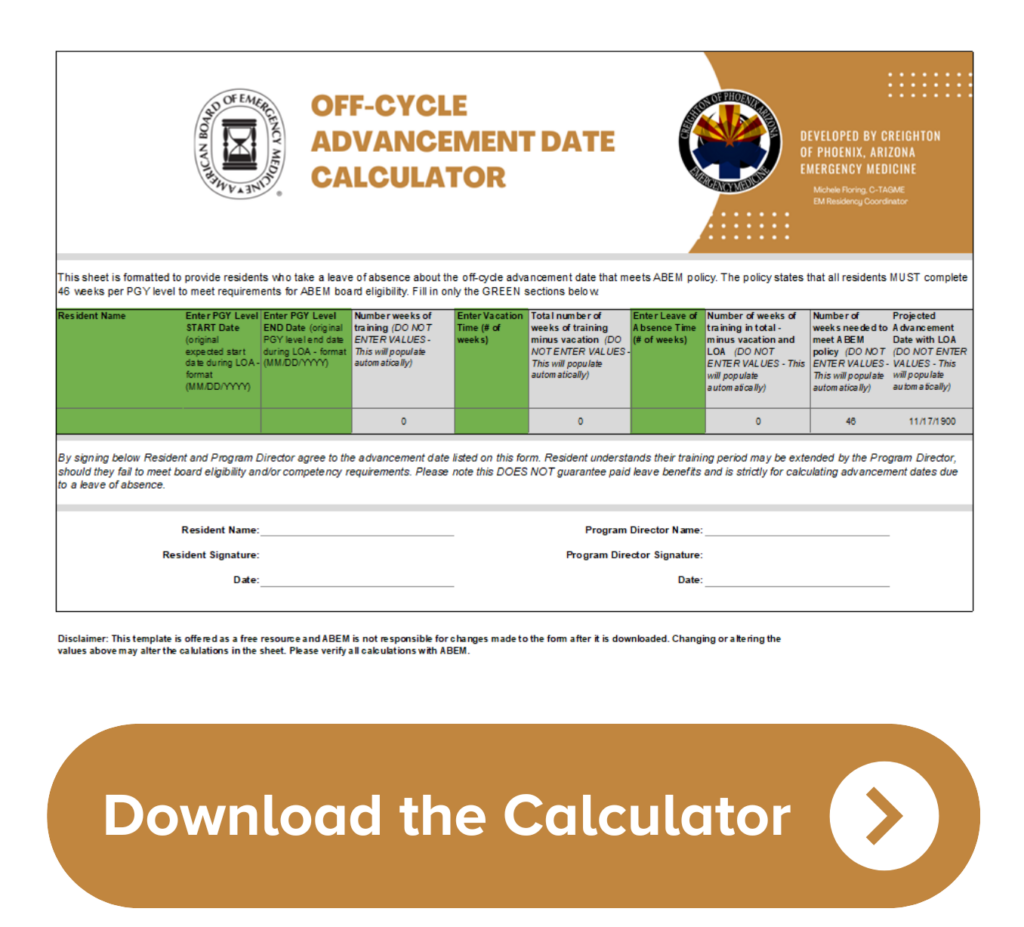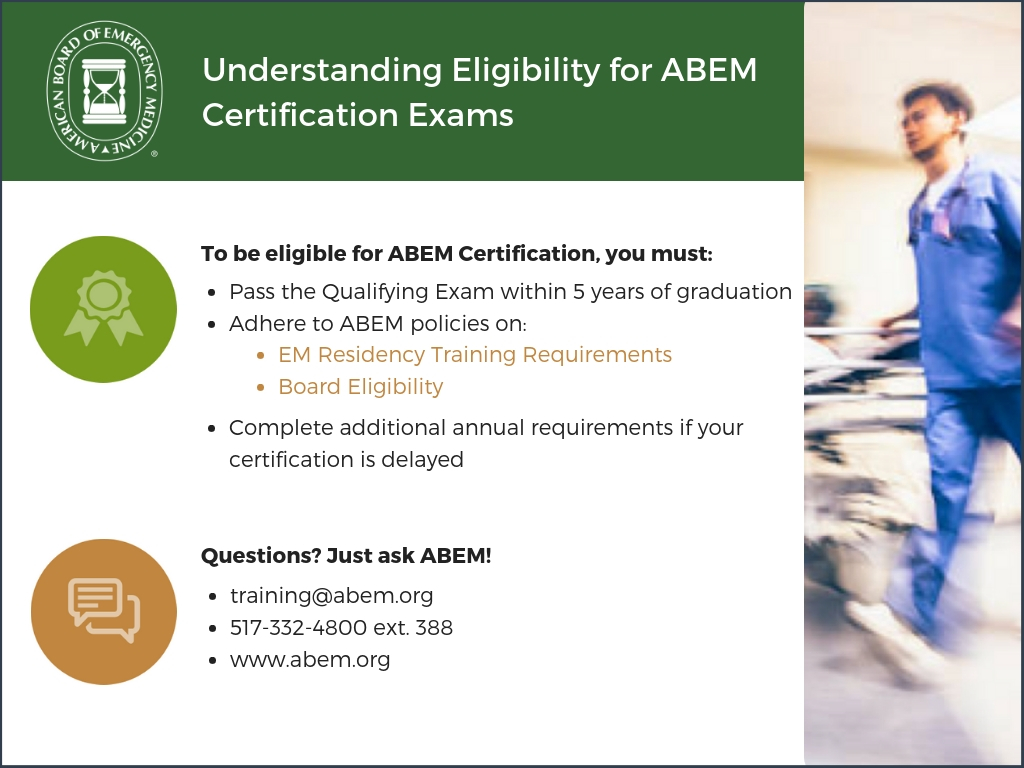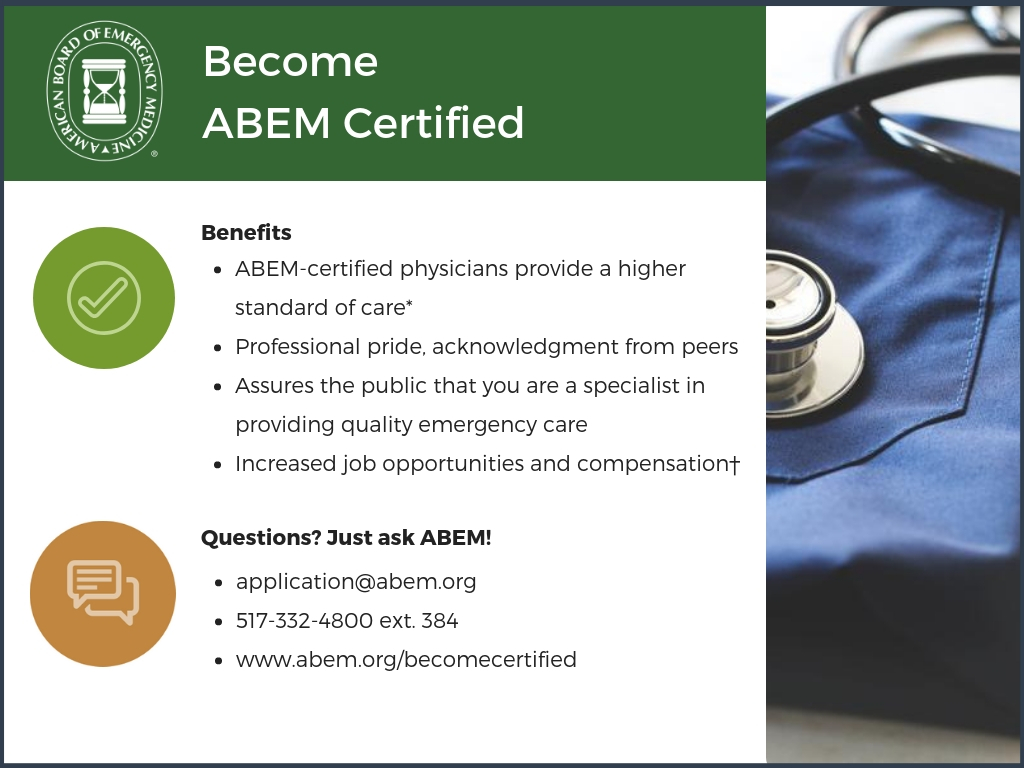- Get Certified
- Certification Process
- Subspecialties and FPDs
- Focused Practice Designations
- Anesthesiology Critical Care Medicine
- Emergency Medical Services (EMS)
- Health Care Administration, Leadership, & Management (HALM)
- Hospice and Palliative Medicine
- Internal Medicine – Critical Care Medicine
- Medical Toxicology
- Neurocritical Care
- Pain Medicine
- Pediatric Emergency Medicine
- Sports Medicine
- Undersea and Hyperbaric Medicine
For Program Directors
Key Dates
Academic Year At-a-Glance
| Event | Dates | What you need to do |
Annual Training Information Survey (TIS)Collects program information to ensure EM In-training Examination (ITE) eligibility and that graduates meet the minimum requirements for certification. You will also use the TIS to pre-register for the ITE. | Available July 1 – October 31 |
|
In-Training Exam (ITE) | February 25 – March 1, 2025February 24 – 28, 2026 |
|
Application Cycle for Initial CertificationEM residents graduating on or before October 31 can apply in the same year they graduate. However, they should NOT wait until after graduation to apply. | Mid April – Early September |
|
ABEM Certification ReportsABEM will send you a report that includes:
| Spring | View the report |
Graduate Verification of Training | Late June – Early July |
|
Informational Resources
Credit for training in other specialties
The ABEM Policy on Credit for Training in Other Specialties provides an opportunity for residents to receive credit for a portion of their previous Accreditation Council for Graduate Medical Education (ACGME)-accredited, non-EM primary residency training when they transfer to an ACGME-accredited, EM residency program. This could reduce the total length of a resident’s EM training.
EM program directors must submit equivalent credit requests with all required documentation to ABEM, and ABEM must approve the request, prior to the resident beginning the EM program.
How to Submit a Request for Equivalent Credit
ABEM requires the following documentation for an equivalent credit request to be emailed to training@abem.org:
A completed Request for Credit for Training in Other Specialties form.
- A copy of the non-EM certificate of completion and/or letter from the non-EM program director verifying that at least 12 months of the resident’s training was successfully completed.
- A copy of the non-EM training program’s standard curriculum.
- A copy of the EM training program’s standard curriculum.
- A copy of the non-EM training program’s block diagram.
- A copy of the EM training program’s block diagram.
If you have specific questions or comments regarding the process for requesting equivalent credit, please contact the ABEM office at 517-332-4800, option 3, or training@abem.org.
Combined Training Programs
The Residency Visitation Program (RVP)
The RVP is a NO COST opportunity for your residents to receive a presentation from a member of the ABEM Board of Directors. It is provided to EM residency programs once every three to four years to try and make the presentation available to each resident at some point during their training.
The presentation includes information about:
- Board eligibility
- The steps to becoming ABEM certified
- Details about certification examinations
- The development of Emergency Medicine as a specialty
EM Residency Program Directors are notified in the spring prior to the academic year in which they are offered the presentation.
Questions? Contact communications@abem.org
Off-Cycle Calculator
Thank you to Michele Floring, C-TAGME, EM Resideny Coordinator at Creighton of Phoenix, Arizona Emergency Medicine for developing and sharing this resource.
Exam Development
To become ABEM certified, candidates must demonstrate competence in the KSAs (knowledge, skills, and abilities) through the examination process. ABEM exam content is based on the EM Model, which is updated every three years to be the most current source of EM information.
Learn more about the Oral Exam
In-Training Exam (ITE)
ABEM develops and administers an In-training Examination (ITE) annually to Emergency Medicine residency programs. Programs are not required to participate in this exam.
The primary purpose of the ABEM In-training Examination is to provide an estimate of the likelihood that a resident will be able to pass the Qualifying Examination. The ITE targets the expected knowledge and experience of an EM3 resident. The exam is not designed for program evaluation, and the results should not be used to compare programs or residents across programs.
The Qualifying Exam
The Qualifying Examination (QE) is designed to measure medical knowledge and diagnostic reasoning. It is administered one week each fall in over 200 computer-based Pearson VUE centers in the US and Canada.
Certifying Exam
In 2026, ABEM will launch the Certifying Exam and the former Oral Certification Exam will be retired. The Certifying Exam will test additional competencies that cannot be tested on the Qualifying Exam or current Oral Exam.
Get the latest information and updates on the new exam here.
Residency/Fellowship Change Form Links
Click on the applicable link(s) provided below to report training changes to ABEM.
For Your Residents
Communications
The Resident Ambassador Panel (RAP)
Emergency Medicine residents are the voice of our specialty’s future! That’s why we have a Resident Ambassador Panel (RAP), which provides a resident’s perspective on certain ABEM activities. The Panel is comprised of three EM residents serving two-year terms. Learn more



